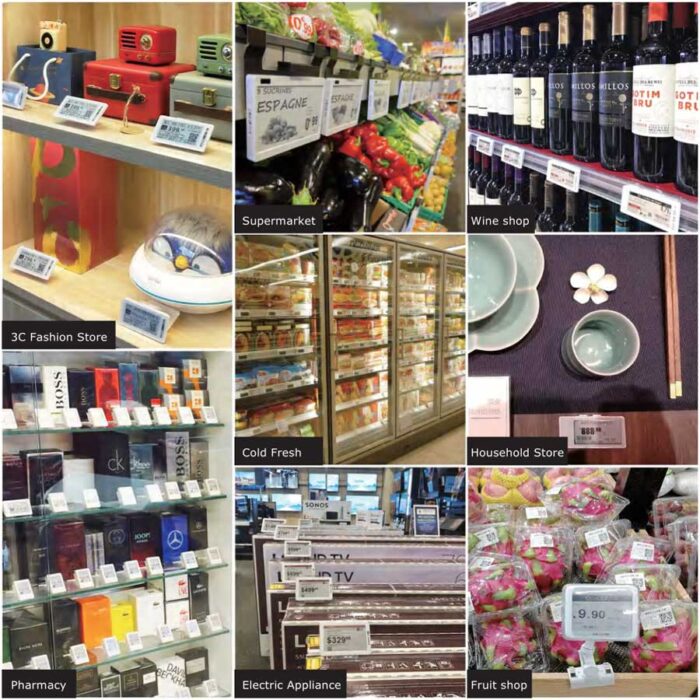
ESL Solution
Electronic Shelf Label (ESL) systems are a modern retail solution that replaces traditional paper price tags with digital displays. ESL systems typically use e-ink or LCD screens to show pricing, product information, and other dynamic content in real time. They are commonly integrated with a store’s backend systems (e.g., inventory management, point-of-sale systems) to provide seamless price updates, improve operational efficiency, and enhance the overall customer shopping experience.
If you’re considering ESL solutions for your retail business, it’s important to weigh the initial investment with the long-term operational and customer engagement benefits. With the right integration and technology partners, ESL can become a game-changer in the way you run your retail operations.
Use Cases of ESL Solutions
Supermarkets & Grocery Stores
ESL solutions in grocery stores help with real-time updates on prices and promotions across thousands of products. For example:- Instant updates during promotions (e.g., flash sales, “Buy One Get One” offers).
- Displaying nutritional information or origin of products to meet consumer demand for transparency.
Apparel and Fashion Retailers
For clothing stores, ESL can enhance customer experience by showing the availability of different sizes, colors, and styles. It also allows for faster response times during markdowns and promotions, keeping pricing consistent across all stores.- Real-time size and color availability on the label.
- Visual consistency in pricing and promotions across stores.
Electronics Retailers
ESLs are particularly useful in electronics stores where pricing is often subject to frequent changes, especially during sales events or product updates. ESLs provide accurate pricing and product details in real time, preventing customers from being confused by outdated information.Pharmacies and Drug Stores
ESLs in pharmacies can display drug dosage instructions, price changes, and stock availability to improve operational efficiency. Customers can also scan a QR code on the ESL to access detailed product information or reviews.Warehouse and Logistics
ESL can also be used for inventory tracking in large warehouse settings. Labels can display key information like stock counts, product IDs, and reorder statuses, helping warehouse workers manage stock levels more efficiently.
Benefits of ELS System
Save Cost
Realizing real-time automatic price change, saving labor costs and management costs. Paperless operation, saving material consumption and protecting the environment.
Efficient Operation
Efficient communication and real-time synchronization of the database, bidirectional data validation to ensure data accuracy. Real-time promotion, various short-term promotions (weekend promotions, time-limited promotions) can be carried out quickly in different environments to increase sales.
Optimal Management
Optimizing price changing, displaying and picking, improving work efficiency. Realizing could manage floating price in multiple stores at the same time. Real-time carry out marketing campaigns in real time flexible.
Customer Experience
The product information becomes plentiful and accurate, increasing interactivity between the brand and consumers. Promoting storefront image, promoting consumers' shopping experience, increasing footfall.
Challenges and Considerations
Initial Investment
The cost of implementing an ESL system can be significant, especially for small and medium-sized businesses. This includes purchasing the labels, setting up the network, and integrating the system with existing infrastructure.Technology Compatibility
Some retailers may encounter challenges with integrating ESLs into their current point-of-sale (POS) or inventory management systems. Ensuring compatibility between systems is essential for smooth operation.Battery Life and Maintenance
While e-ink displays are low power, maintaining the batteries in ESLs and ensuring the durability of the labels is critical, particularly for large-scale deployments.Security and Data Integrity
As ESLs are often connected to a network, maintaining data security and ensuring consistent communication between the labels and the central system is crucial to avoid system malfunctions.
Conclusion
Electronic Shelf Labels (ESL) provide a cutting-edge solution for modern retail environments, allowing businesses to automate price updates, enhance customer engagement, and improve operational efficiency. The ability to update pricing, product details, and stock availability in real time offers significant advantages, from cost savings to improved customer satisfaction. As retail continues to evolve, ESL systems are poised to play a key role in enhancing both the customer experience and internal management.
If you’re considering ESL solutions for your retail business, it’s important to weigh the initial investment with the long-term operational and customer engagement benefits. With the right integration and technology partners, ESL can become a game-changer in the way you run your retail operations.
ESL Products
EAS Supermarket Solution provides a one-stop security solution for supermarket retail through tag IoT, anti-theft alarm products, and decoding devices. The homework efficiency is improved by 3-5 times, greatly saving loss prevention costs and labor costs.

Heading One

Heading Two

Heading Three

Heading Four

Contact us now!
Tel/WhatsApp:
E-mail:
Location: